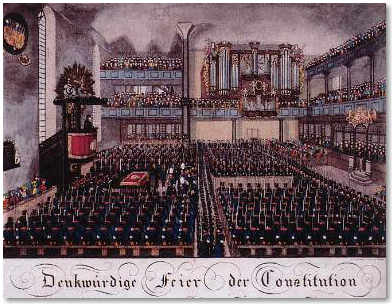On the occasion of the enactment of the
Constitution on January 5, 1831, festive events
were held all across the Electorate including in
Hersfeld, where Dr. Faber, the Director of the
Gymnasium, gave a speech in the school
auditorium, the manuscript for which has been
preserved. How must it have affected the
Jewish student Carl Dellevie, when his
principal's view was that happiness in our life
on earth, and in particular life in the Electorate
of Hesse, depends on belief in Jesus; and when,
in his summary, he thanked "our Father in
heaven" for the good laws of the land and
invoked God's support "for the sake of Jesus"?
Was the principal aware of what this theological
interpretation meant for the Jewish student Carl
Dellevie?
Yet in his January 10 speech on the
Constitution he had explicitly called upon the
citizens of Hersfeld to "look upon all the
inhabitants of the Fatherland as their brothers."
Had the leader of the Hersfeld Gymnasium
become aware of how disappointing the
outcome of the discussion on the Constitution
had been for the Jewish minority?
In any case, several weeks later Dr. Faber
distinguished the Jewish student Carl Dellevie
by allowing him, together with three other
Abitur graduates, to give a speech at the
graduation celebrations. For Carl Dellevie, Dr.
Faber chose the theme: "The Situation of
European – and especially German – Israelites
[Jews] in the Middle Ages and in More Modern
Times." In this way Principal Faber permitted
his Jewish student to give a lecture on a theme
that was important and current, for him in
particular.
Just as in Hanau (above), the new Constitution,
enacted on January 5, 1831, was received in
Hersfeld with festive events. It did not yet
establish the legal equality that the Jews had
hoped for -- that came two years later with the
law of October 29, 1833.









